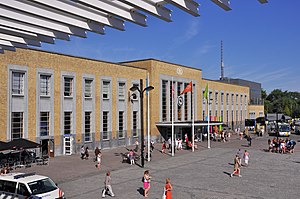Brugge railway station
Brugge | |
|---|---|
 | |
| Location | Stationsplein, Bruges |
| Coordinates | 51°11′50″N 3°13′2″E / 51.19722°N 3.21722°ECoordinates: 51°11′50″N 3°13′2″E / 51.19722°N 3.21722°E |
| Owned by | National Railway Company of Belgium |
| Line(s) | 50A (Brussels-Ostend) (Bruges-Blankenberge) (Bruges-Kortrijk) |
| Platforms | 5 island platforms |
| Tracks | 12 (1 head track) |
| Other information | |
| Station code | FR |
| History | |
| Opened | 12 August 1838 |
| Passengers | |
| 2014 | 18,122 |

Brugge railway station (French: Gare de Bruges) is the main railway station in Bruges, West Flanders, Belgium. The station opened on 12 August 1838 on the Lines 50A, and . The current building has been in use since 1939. The station is one of the busiest in Belgium. Train services are operated by NMBS/SNCB.
History[]
The railway arrived in Bruges in 1838 when the Ghent to Bruges railway was opened, with King Leopold I and Queen Louise-Marie. The line was closer to the city centre than it is today, passing through the large square 't Zand within the medieval walls. A couple of weeks later the Bruges to Ostend railway was opened. In the first 6 years of its existence there was no station building, this opened on 't Zand in 1844, designed by Auguste Payen. The railway to opened in 1846-1857 and lines to Eeklo and in 1863. The result of the success of the railways was that the station was too small. In 1879 the building was demolished and reconstructed at , where it still stands today. A new station building was completed in 1886, designed by Joseph Schadde.
Work started on the present-day railway alignment outside the city walls in 1910, but it was abandoned during the First World War and not completed until 1936. The current station building, designed in the International Style by the brothers Josse and Maurice Van Kriekinge, opened in 1938. The 1886 station remained, derelict, on 't Zand throughout the Second World War, before its eventual demolition in 1948.[1]
The station was served by a daily Thalys high speed service to Paris between 1998 and 31 March 2015.[2]
Modernisation[]
In 2007 the station was the 10th busiest station in Belgium and there was a large increase in passengers expected over the coming years. In 2004 a modernisation and expansion of the station started. The tunnel under the platforms was expanded by 12 metres, allowing more space for passengers and small shops. Access to the platforms was improved with new stairs, escalators and lifts. The works were completed in May 2009. Behind the station an underground car park for 800 cars and 1000 bikes was completed in 2010.
Train services[]
The station is served by the following services:
- Intercity services (IC-01) Ostend - Bruges - Ghent - Brussels - Leuven - Liege - Eupen
- Intercity services (IC-02) Ostend - Bruges - Ghent - Sint-Niklaas - Antwerpen
- Intercity services (IC-03) Knokke/Blankenberge - Bruges - Ghent - Brussels - Leuven - Genk
- Intercity services (IC-23) Ostend - Bruges - Kortrijk - Zottegem - Brussels - Brussels Airport
- Intercity services (IC-23A) Bruges - Ghent - Brussels - Brussels Airport (weekdays)
- Intercity services (IC-32) Bruges - Roeselare - Kortrijk
- Local services (L-02) Zeebrugge - Bruges – Ghent – Dendermonde – Mechelen (weekdays)
- Local services (L-02) Zeebrugge - Bruges – Ghent (weekends)
References[]
This article needs additional citations for verification. (April 2015) |
External links[]
 Media related to Bruges train station at Wikimedia Commons
Media related to Bruges train station at Wikimedia Commons- Belgian Railways website for Brugge
| Wikimedia Commons has media related to Bruges train station. |
- Railway stations in Belgium
- Railway stations in West Flanders
- Buildings and structures in Bruges
- Railway stations opened in 1838
- 1838 establishments in Belgium
- Belgian railway station stubs
- Railway stations in Belgium opened in 1838
